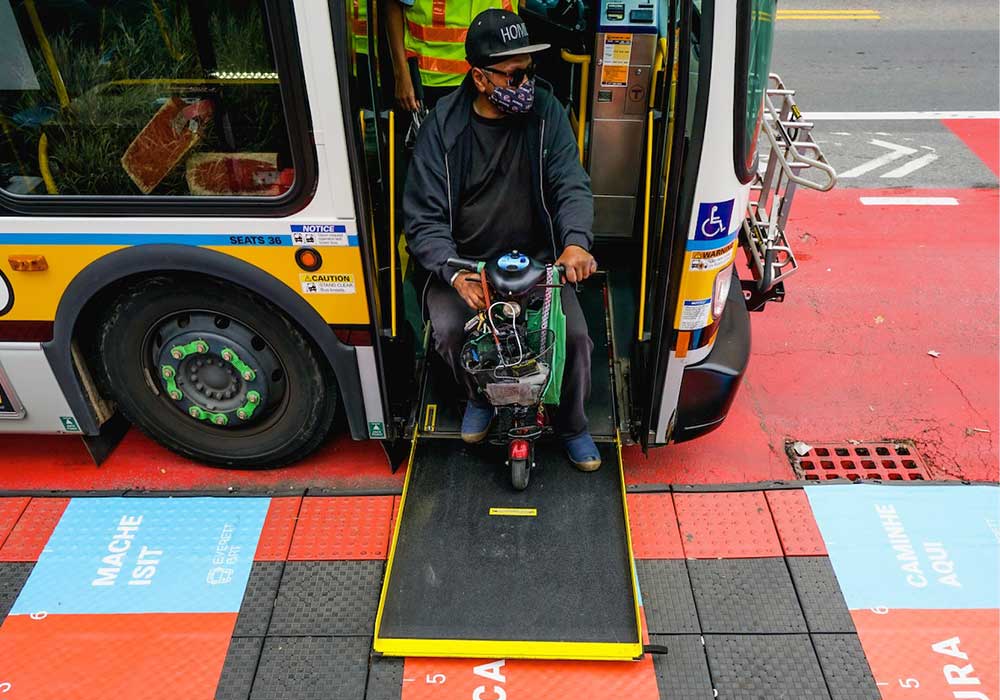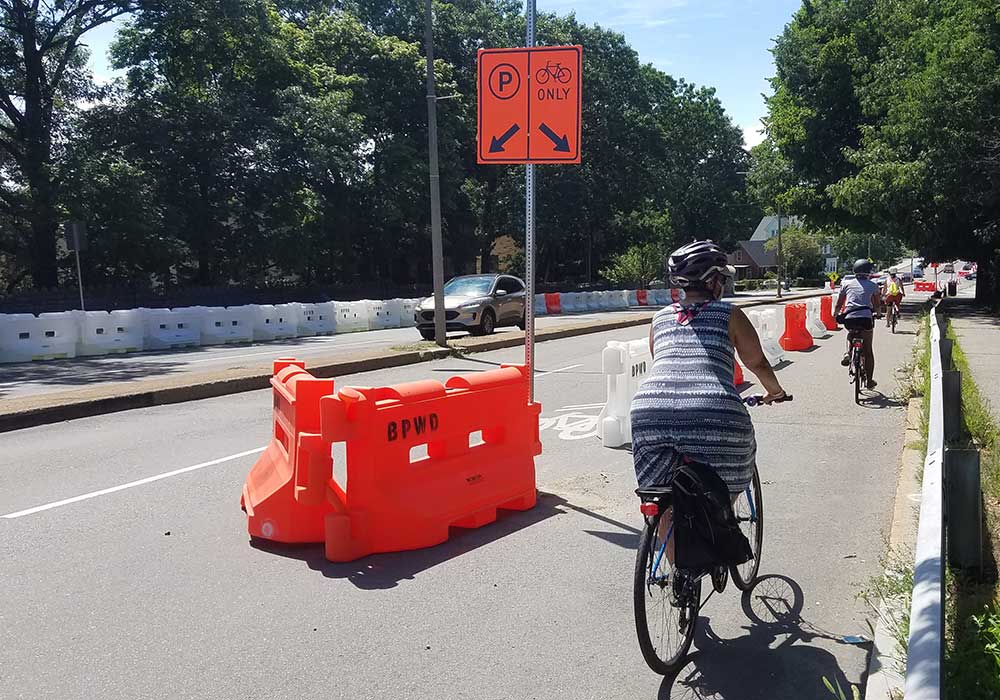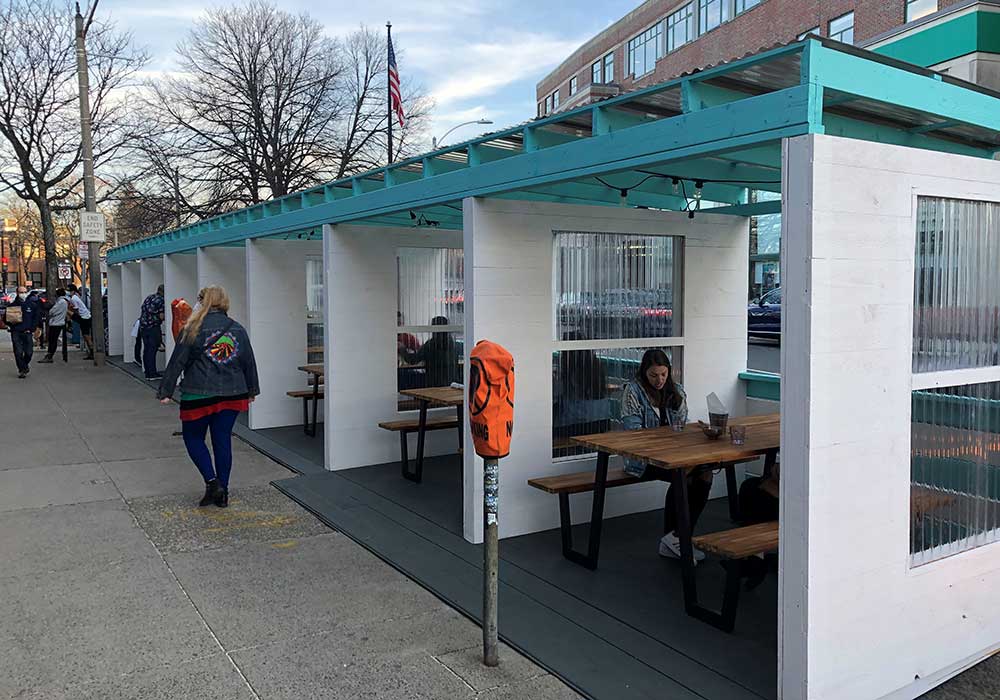Shaping the Future of Municipalities Through Investment in Shared Spaces

Even as communities approach widespread vaccination, we know life will never be the same as before COVID-19.
In many ways, cities are now at an inflection point. As we recover from the pandemic and confront challenges like climate change and inequality, we have an opportunity to build back better than before by investing in our shared future.
One way we can do that is by investing in public spaces. Giving people more options to be outside and connect to their communities helps to prevent the spread of the virus in the short term while also supporting our community's mental health and helping to create more fun and livable cities over the long run.
One program in Massachusetts called the Bay State's Shared Streets and Spaces grant program offers a glimpse into the meaningful quality of life improvements that we can take with us into the future if we continue to design healthy, fun, safe, and affordable ways for people to get around within our communities.
Bay State's Grant Empowers Community Innovations
The Bay State's Shared Streets and Spaces grant program has supported 143 communities — from cities to small towns — in testing ideas to improve local outdoor spaces so that people can safely be in public together during the pandemic. Administered by the Massachusetts Department of Transportation (MassDOT) with support from the Barr Foundation, the Solomon Foundation, the Metropolitan Area Planning Council (MAPC), and other nonprofit partners, the program has empowered municipalities across Massachusetts to implement changes that make their streets, sidewalks, and other public spaces more equitable, inclusive, and accessible.
The Shared Streets and Spaces grant program has successfully piloted projects and policies that in many cases will now be made permanent. The projects may look simple, such as setting up a few chairs for strangers to have small talk, slowing down traffic so kids can play, and adding a bus stop for essential workers, but they all strengthen community bonds, combat loneliness, keep downtowns buzzing, and remind us that we're all in this together.

A raised bus boarding platform featuring on-ground signage with social distancing guidance in Everett. Photo by BostonBRT.
Rapid Grants Foster Equitable Spaces
The Shared Streets and Spaces grant program was formed in June 2020 in response to COVID-19 and has so far invested $21.6 million in 194 projects, with 60 percent in designated environmental justice communities. All municipalities and public transportation authorities are eligible to apply for grants ranging from $5,000 to $500,000, depending on project type, through an intentionally simple online application process.
Applications are reviewed and grants are made as quickly and seamlessly as possible to deliver funding and support to communities quickly. At this stage of the program, extra points are awarded during the scoring process for projects that provide better access and opportunities for school children and elders, open space and public transit, and environmental justice and "COVID-19 red" communities. Finally, pro bono technical assistance is available to all municipalities, funded by the Barr Foundation, for assistance in developing applications. Another unique aspect of this program is that grants are paid in full and upfront, unlike other grant programs that are paid through reimbursement.
Eligible Projects

Shared streets offer low volume, low stress opportunities for outdoor recreation and a safe way to travel for residents in Arlington. Photo by Jessica Mortell.
Five types of projects are eligible for the Shared Streets and Spaces grant program:
Main Streets
- Making investments in local downtowns and villages by repurposing streets, plazas, sidewalks, curbs, and parking areas to facilitate people-centric activities and community programming.
Reimagined Streets
- Prioritizing safe space for people walking and biking by implementing low-speed streets, "shared streets," new sidewalks, new protected bike lanes, new off-road trails, new bicycle parking, new crosswalks, traffic-calming measures, and ADA-compliant ramps.
Better Buses
- Improving bus riders' commutes by establishing new facilities for buses, including dedicated bus lanes, traffic-signal priority equipment, and bus shelters.
Shared Mobility
- Supporting the capital costs of new bike-share equipment to support more people trying cycling.
Investments in the Future
- Converting temporary/pilot shared streets projects, including those not funded by MassDOT, to permanent facilities to benefit community members over the long term.
Enhancing Spaces for Community Engagement
Whether through more vibrant Main Streets and greenspaces, safer routes to school or work, warmer places to safely gather or wait for the bus, people and communities alike are benefiting from the Shared Streets and Spaces grant program, which continues to create increased space for people to move around safely, engage in commerce, recreate, and participate in civic life. Communities that have seen successful adoption of shared streets projects have also found an opportunity to lay the groundwork for the adoption of regulatory change in areas like three-season dining or expedited permitting processes.

Cummins Highway Boston quickly built a protected bike lane during COVID-19. Photo by LiveableStreets Alliance.
Successful Projects
Here are some examples of the variety of projects that have emerged through the program:
Main Streets
- Great Barrington — Temporary barriers on Railroad Street created space for outdoor dining, commerce, community gathering, and entertainment, supporting residents and local business owners.
- New Bedford — Multiple new outdoor dining destinations and safe pedestrian spaces within the city.
Reimagined Streets
- Belchertown — New safe, child-friendly neighborhood walking and biking trail that connects to schools and other essential destinations and workplaces.
- Chelsea — New crossings at the Chelsea Elementary School and Brown Middle School make the walk to school safer for kids.
Better Buses
- Brockton — Installation of 10 new bus shelters with heaters to give dignity and comfort to bus riders.
- Lynn — New bidirectional, curb-running shared bus-bike lanes and two transit signal priority treatments to speed up trips for bus riders and cyclists.
- Somerville — New transit priority treatments, with additional benefits to bicyclists and pedestrian safety on Washington Street at McGrath Highway.
Shared Mobility
- Boston — New bike-share stations for residents in East Boston, Mattapan, Dorchester, and Roslindale
- Newton — Four new bikeshare stations with both electric-assist and pedal-powered bikes.

Davis Square, Somerville outdoor dining in April 2021. Photo by Ralph Willmer, FAICP.
Top photo: Downtown Belmont transformed into a Shared Street for people, public transit, retail, and dining during COVID-19. Photo by David Loutzenheiser.


